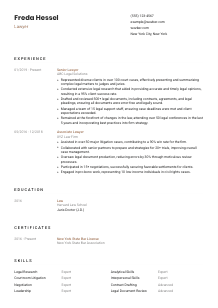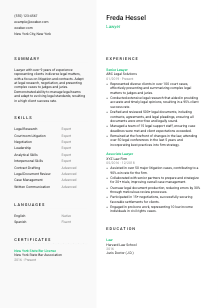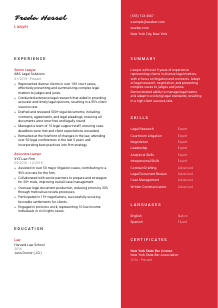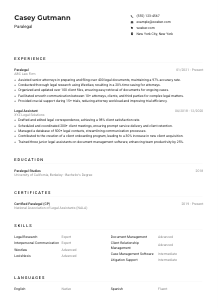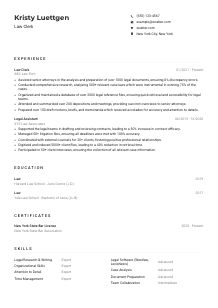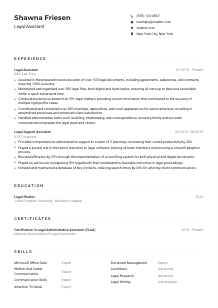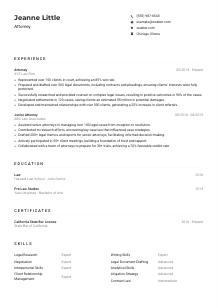Lawyer Resume Example
Arguing cases, but your resume doesn't make a strong defense? Present Exhibit A: this Lawyer resume example, crafted with Wozber free resume builder. Discover how you can integrate your legal acumen with job requirements to ensure your career stays in the "admissible" zone!
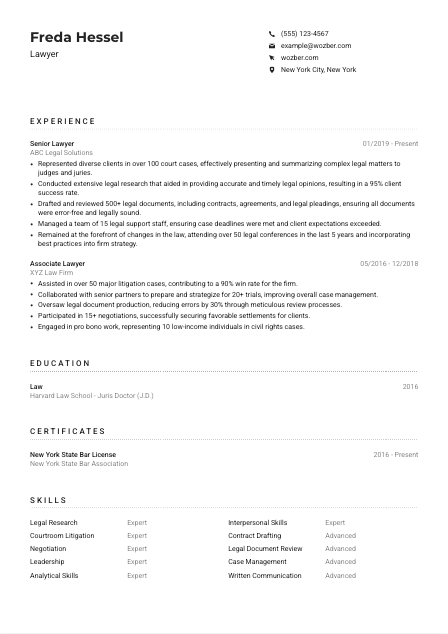
How to write a Lawyer resume?
Aspiring to join the ranks of esteemed legal practitioners? The path to standing out in a stack of lawyer resumes begins here. We understand that crafting a resume might seem like drafting a brief - it needs precision, relevance, and a touch of flair.
That's why we've tailored this guide specifically for you, using Wozber's free resume builder. Let's embark on a mission to align your legal expertise seamlessly with your dream job's demands, ensuring your resume passes the ATS scan with flying colors.
Personal Details
The Personal Details section might seem straightforward at first glance, but it's your initial handshake with potential employers. Here's how to optimize this section for a Lawyer position, ensuring your candidacy doesn't get dismissed on a technicality.
1. Craft Your Name as Your Brand
Your name is your headline, so let it stand proud. Use a professional, readable font that says you're serious about your career. Think of it as the case caption in a court document—clear and impossible to overlook.
2. Align Your Title with the Job
Just below your name, directly align your career aspiration with the job by stating ‘Lawyer.' This not only shows your commitment to the role but also helps your resume speak directly to the job description, a crucial step for ATS optimization.
3. Ensure Your Contact Information is Judicially Sound
List your most reliable contact number and a professional email address that features your name. This is not the place for nicknames or creative flairs. Think of it as listing your contact info in a legal document—accuracy is key.
4. Highlight Your Jurisdictional Compatibility
Since our target job requires being located in New York City, New York, clearly state your location. This immediate match reassures potential employers of your logistical fit, removing any doubts about relocation.
5. Professional Profile: To Exhibit or Not?
If you have a LinkedIn profile or a personal website showcasing your legal endeavors, include it. Make sure it's polished and mirrors the professionalism of your resume. A well-maintained online presence can be an asset, showing you're tech-savvy and engaged in the legal community.
Takeaway
Consider the Personal Details section as the preliminary hearing of your application. It's your moment to make a strong first impression, setting a professional and attentive tone right from the start. Ensure this info is precise, and geared towards showing you're the perfect candidate for the role.





Experience
The Experience section is the core of your legal resume, shedding light on your career journey. Let's ensure it testifies to your suitability for this Lawyer role, showing not just where you've been, but how those experiences prepare you for this next step.
- Represented diverse clients in over 100 court cases, effectively presenting and summarizing complex legal matters to judges and juries.
- Conducted extensive legal research that aided in providing accurate and timely legal opinions, resulting in a 95% client success rate.
- Drafted and reviewed 500+ legal documents, including contracts, agreements, and legal pleadings, ensuring all documents were error‑free and legally sound.
- Managed a team of 15 legal support staff, ensuring case deadlines were met and client expectations exceeded.
- Remained at the forefront of changes in the law, attending over 50 legal conferences in the last 5 years and incorporating best practices into firm strategy.
- Assisted in over 50 major litigation cases, contributing to a 90% win rate for the firm.
- Collaborated with senior partners to prepare and strategize for 20+ trials, improving overall case management.
- Oversaw legal document production, reducing errors by 30% through meticulous review processes.
- Participated in 15+ negotiations, successfully securing favorable settlements for clients.
- Engaged in pro bono work, representing 10 low‑income individuals in civil rights cases.
1. Dissect the Job Description
Begin with an in-depth analysis of the job description, underlining keywords like ‘legal research,' ‘contract negotiation,' and ‘courtroom representation.' These are your targets for ATS optimization, guiding how you'll present your experience.
2. Emphasize Your Roles and Firms
Structure your experience chronologically, with your most recent position at the top. For each role, clearly list your title and the firm's name, casting the spotlight on your progression and the caliber of your professional environment.
3. Tailor Your Accomplishments
For each position, emphasize accomplishments that resonate with the job requirements. Did you streamline a document review process, lead a negotiation to a favorable settlement, or represent pivotal cases? Here's where you portray your expertise and its impact.
4. Quantify Your Legal Victories
Whenever possible, quantify your successes. Mention the number of cases won, the percentage increase in client satisfaction, or the monetary value of negotiated contracts. Numbers bring your contributions to life and prove your prowess.
5. Relevance Is Your Litmus Test
While breadth of experience is impressive, depth in areas aligned with the job description is crucial. Limit entries to those that showcase the skills and accomplishments most relevant to the position, ensuring each bullet point reinforces your candidacy.
Takeaway
The Experience section is where your professional narrative unfolds. It's not just a list of jobs—it's your portfolio of accomplishments, crafted to convince the hiring manager that you're the best candidate for the role. Be strategic, be precise, and above all, ensure your experience speaks directly to the heart of the job requirements.
Education
The Education section of a Lawyer's resume is more than just a nod to your academic credentials. It's a testament to your foundational expertise and commitment to the profession. Let's optimize this section to underscore your qualifications for the role.
1. Highlight Your Juris Doctor Degree
Start with the cornerstone of your legal education—the Juris Doctor (J.D.) degree. This not only checks a major requirement box for the job but also sets the stage for showcasing your specialized legal training.
2. Structure with Clarity
Your education entries should be straightforward: degree, field, institution, and graduation date. This format is ATS-friendly and makes it easy for hiring managers to verify your qualifications at a glance.
3. Tailor Degree Details
Ensure your degree title exactly matches that in the job requirements, if applicable. For example, listing your 'Juris Doctor (J.D.) in Law' highlights your direct compliance with the specified educational criteria.
4. Showcase Relevant Extras
If you've taken specialized courses, participated in moot court competitions, or been involved in law review, briefly mention these. Such extras can differentiate your application, showcasing your dedication to the legal field beyond the classroom.
5. Assess the Value of Other Achievements
While early in your career, honors or involvement in legal societies can add value, focus mainly on achievements that reinforce your readiness and suitability for the role, especially as you gain more experience.
Takeaway
Your educational background is more than a list of degrees—it's proof of your legal acumen and commitment to the profession. By clearly aligning your education with the job's requirements and showcasing relevant achievements, you solidify your stance as a well-prepared candidate. Remember, every detail counts in convincing potential employers of your fit for the role.
Certificates
In the legal field, continuous learning and professional development are crucial. The Certificates section of your resume is where you highlight your dedication to staying abreast of changes and deepening your expertise. Let's make sure it reflects your commitment to excellence.
1. Identify Job-Specific Certifications
While the job posting may not specify required certifications, aligning your listed certificates with the position's needs can significantly bolster your application. Focus on certifications that demonstrate your deep understanding of the legal landscape or specific skills relevant to the role.
2. Select Certificates with Precision
Quality over quantity matters. List certificates that best showcase your expertise and commitment to your legal career path. Remember, each certificate listed should resonate with the job's demands and your role as a Lawyer.
3. Provide Dates for Your Achievements
If relevant, include the issuance date of your certifications, especially if they are recent. This signals to potential employers your initiative in staying current within your field.
4. Prioritize Ongoing Education
The legal landscape evolves constantly. Your engagement in ongoing education through certifications not only showcases your adaptability but also your proactive approach to career development. Keep this section updated as you acquire new certifications.
Takeaway
Your certificates are a testament to your pursuit of excellence and commitment to staying at the forefront of legal developments. By strategically selecting and presenting relevant certifications, you underscore your expertise and readiness for the challenges of the Lawyer role. Keep learning, and let your resume reflect your quest for legal mastery.
Skills
The Skills section is your resume's arsenal, showcasing the tools you wield with precision in your legal career. For a Lawyer, this spans both the courtroom and the boardroom. Let's ensure this section highlights your legal acumen and versatility as a practitioner.
1. Decode the Job's Language
Start by dissecting the job description for keywords and phrases that resonate with essential skills. ‘Legal research,' ‘courtroom litigation,' and ‘contract negotiation' are not just tasks; they're skills that you've honed over years of practice, so ensure they're prominently featured.
2. Balance Hard and Soft Skills
A successful Lawyer balances analytical prowess with interpersonal effectiveness. Include both hard skills like 'Legal Document Review' and soft skills such as 'Negotiation' and 'Interpersonal Skills.' This shows you're not only technically proficient but also a adept at navigating the nuances of client and stakeholder relationships.
3. Present a Curated Collection
While you may possess a broad skill set, focus on listing those most relevant to the job at hand. This not only keeps your resume focused but also speaks directly to the hiring manager's needs, making it clear why you're the ideal candidate for the position.
Takeaway
The Skills section is your opportunity to present yourself as a well-rounded legal professional with a versatile toolkit. By carefully selecting skills that align with the job description and balancing technical expertise with interpersonal savvy, you position yourself as not just a viable candidate, but the best choice for the role.
Languages
In a profession that prides itself on eloquence and clarity, your language capabilities can set you apart. Whether communicating with a client or drafting a legal document, your proficiency speaks volumes. Here's how to make your Languages section as compelling as your oral arguments.
1. Match the Job's Requirements
Firstly, ensure you list English as 'Native' or 'Fluent,' directly aligning with the job requirement. This non-negotiable skill forms the basis of your competency and showcases your readiness for the role.
2. Highlight Additional Languages
If you're fluent in another language, like Spanish, list it next. This not only demonstrates your versatility but also your potential to communicate effectively in diverse legal contexts or with clients who may prefer communicating in their native language.
3. Be Honest About Proficiency Levels
Accurately state your proficiency for each language. Misrepresenting your skills could lead to awkward situations, particularly in high-stakes legal environments. Honesty is the best policy, demonstrating integrity and self-awareness.
4. Consider the Role's Geographic and Cultural Scope
For positions that interact with international law or diverse populations, proficiency in additional languages can be a significant asset. If the role hints at such exposure, make sure your linguistic prowess is front and center.
5. Embrace Your Multilingual Identity
Your ability to navigate multiple languages is not just a skill—it's a part of who you are. Treat it as a distinguishing characteristic, one that enhances your ability to engage with a broader spectrum of clients and colleagues.
Takeaway
Your Language skills are a testament to your ability to communicate effectively and empathetically—key traits for any Lawyer. By thoughtfully showcasing your linguistic capabilities, you affirm your readiness to operate in a globalized legal landscape, making you a valuable asset to any firm.
Summary
Just as a compelling opening statement can set the tone for a successful argument in court, a well-crafted Summary in your resume can captivate hiring managers from the start. Let's craft a narrative that champions your candidacy for this Lawyer position, offering a glimpse into your legal prowess.
1. Absorb the Job's Spirit
Begin by internalizing the essence of the job description. Understanding what the employer truly values—be it extensive legal research, courtroom experience, or negotiation skills—allows you to tailor your introduction to resonate with those priorities.
2. Start Strong
Kick off with a declaration of your professional identity: 'Lawyer with over 9 years of experience.' This instantly frames you as a seasoned professional, setting the stage for the specifics of your expertise and achievements.
3. Address the Heart of the Matter
Highlight your skills and accomplishments that sync with the job's demands. For example, showcasing your courtroom prowess, contract negotiation expertise, or leadership in managing legal support staff directly speaks to key requirements of the role.
4. Keep It Compact
While your career may have numerous highlights, your Summary is not the venue for a full recount. Aim for 3-5 impactful lines that encapsulate your most salient strengths and achievements, enticing the hiring manager to delve deeper into your resume.
Takeaway
Your Summary is the doorway into your professional narrative, offering a preview of your legal capabilities and career achievements. By carefully crafting this section to reflect both your identity as a Lawyer and the job's specific requirements, you're setting the stage for a resume that doesn't just pass the ATS scan but compels hiring managers to take action. Let this be the opening argument that wins your case.
Launching Your Lawyer Journey
Congratulations, you've now equipped yourself with the knowledge to craft a resume that not only meets the expectations of potential employers but also passes the rigorous scrutiny of ATS systems. By following these tailored steps and using Wozber's free resume builder, including its ATS-friendly resume templates and ATS resume scanner, you're on your way to securing your next legal role. Remember, your resume is more than a document—it's the narrative of your professional journey.
Fine-tune it with care, let it reflect your unique contributions to the legal field, and watch as it opens doors to new opportunities. The bench is waiting; it's time to make your mark.

- Juris Doctor (J.D.) degree from an accredited law school.
- Admission to the state bar and in good standing, with 5+ years of relevant legal practice experience.
- Extensive knowledge of federal, state, and local laws and regulations within the respective practice area.
- Strong research, writing, and oral communication skills.
- Excellent analytical, negotiation, and interpersonal skills.
- English speaking and comprehension skills required.
- Must be located in New York City, New York.
- Represent clients in court or before government agencies, present and summarize cases to judges and juries.
- Conduct legal research and provide legal opinion on relevant matters.
- Draft, review, and negotiate various legal documents, including contracts, agreements, and legal pleadings.
- Manage and supervise legal support staff, ensuring case deadlines and client expectations are met.
- Continuously update knowledge of changes in the law and remain informed of current legal standards and practices.





